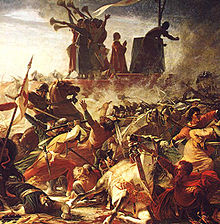La battaglia di Legnano
| La battaglia di Legnano | |
|---|---|
| Opera by Giuseppe Verdi | |

|
|
| Librettist | Salvadore Cammarano |
| Language | Italian |
| Based on |
La Bataille de Toulouse (1828) by Joseph Méry |
| Premiere | 27 January 1849 Teatro Argentina, Rome |
La battaglia di Legnano (The Battle of Legnano) is an opera in four acts, with music by Giuseppe Verdi to an Italian-language libretto by Salvadore Cammarano. It was based on the play La Bataille de Toulouse by Joseph Méry, later the co-librettist of Don Carlos.
Written as a commission from the Teatro Argentina in the "beleaguered republic" of Rome while the composer was still living in Paris, he traveled to Rome in late 1848 to prepare the opera for its first performance, which was given on 27 January 1849. Musicologist Roger Parker describes the première as "a clamorous success, with the entire final act encored" and the audience wild with enthusiasm. He goes to add that act 4 was encored at every performance of the run. However, we learn elsewhere that the opera failed in its 1850 production in Genoa.
In later years Battaglia was given under different settings and different titles until Italian unification allowed for the opera to be presented as originally written. We know that Verdi considered revising it in the 1850s, but never did. While it has not been performed with any frequency, the succession of performances given after its 1959 revival have kept Battaglia in the public eye to this day.
Verdi's 14th opera was written while Verdi was living in Paris in 1848 (though he quickly traveled to Milan after receiving news of the March "Cinque Giornate" – the five days of street fighting which drove the Austrians out of the city) and it seems to have been composed specifically as "an opera with a purpose" (as opera historian Charles Osborne describes it). Osborne continues: "while parts of Verdi's earlier operas had frequently been taken up by the fighters of the Risorgimento [...] this time the composer had given the movement its own opera".
While still writing I masnadieri and with his obligation to complete an opera for the publisher, Francesco Lucca, Verdi had been admonished by the poet Giuseppe Giusti for turning away from patriotic subjects when he composed Macbeth; the poet pleaded with him to "do what you can to nourish the [sorrow of the Italian people], to strengthen it, and direct it to its goal." Verdi replied encouragingly. With his other obligations out of the way, he was hesitant in committing to anything that was not a genuinely patriotic subject, but he despaired that librettists were incapable to providing them until Salvadore Cammarano (who supplied the libretto for the 1845 Alzira) came up with the idea of adapting Joseph Méry's 1828 play La Bataille de Toulouse, a well-known and well-liked play in Italy at that time. "A story like that should stir every man with an Italian soul in his breast" was how the librettist described it.
...
Wikipedia
